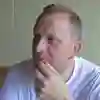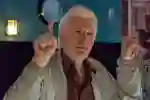Ed Parnell: “Novels, films and stories have always been a huge part of my life”
Ed Parnell, an American Studies graduate, is the author of Ghostland, shortlisted for the PEN Ackerley 2020 Award. His debut novel, The Listeners, won the Rethink New Novels Prize in 2014. In this interview, Ed reflects on memories of Hull, and how stories help us make sense of loss.

Degree
BA American Studies
Year of graduation
1996
Current occupation
Author
What attracted you to the University of Hull?
At the point in sixth form when I was applying to universities, I was really into American literature. I was studying William Faulkner’s As I Lay Dying for English A level, and I’d recently read Kurt Vonnegut’s Slaughterhouse-Five, which is still one of my favourite novels.
I wanted to go somewhere with a good American Studies department. My other main criteria were rather more esoteric and almost certainly based on proximity to good birdwatching sites. With Hull being the nearest university to Spurn Point and Flamborough Head, that proved to be a big draw for me.
What strong memories of your time at Hull do you have?
I have lots of strong memories, although I do look back with the wisdom of experience and wish I could re-run the first year from a learning point of view. I remember skipping lots of lectures due to being hungover or just plain useless. I look back and think, what a waste that I didn’t read all the great novels that I should have done – although, in fairness to myself, there was an enormous amount of reading.
I know I didn’t make it through Moby Dick, though I did attend lectures on it. It was years later before I finally finished it, and it became one of my favourite books. I also really enjoyed all the modules on modernism and post-modernism – that love of Faulkner and Vonnegut again. Those modules in particular introduced me to thinking about painters and visual artists, which was something I hadn’t really done before.
When I was studying in Hull, creative writing wasn’t available as a taught option, although I did take a course on American short stories. It had an assignment that required the students to all write and submit one of our own stories. I really enjoyed that, even though the thing I wrote wasn’t exactly a shining example of the genre.
I think the city itself is probably a good place to get inspiration, because it has its own distinct identity and that slightly isolated, end-of-the-line feel – a bit like my own nearest city, Norwich.
Hull is a good place to get inspiration... it has
that slightly isolated, end-of-the-line feel
What role does geography play in your writing? And did the geography of Yorkshire and Hull inspire you?
Location was the overriding factor in my first book, the novel The Listeners. It’s set in May 1940 in an isolated west Norfolk village. It’s that point where the War has been going on for several months, but its effects haven’t, up to that point, really been felt back in Britain. All that’s about to change with Dunkirk and how things rapidly escalate afterwards.
It’s really a novel about family secrets and I based the location on the tiny village where my grandmother lived, which I loved to visit as a kid. Its gothic woods, which I’d wander round on my own, seemed magical and exotic in comparison to the flat Lincolnshire landscape in which I’d grown up, and I loved all the folklore and stories that clung to those meadows and trees.
With Ghostland, which is a work of narrative non-fiction, the British landscape and its buried layers of histories and hidden stories was also a huge factor in the book. There was a chapter in the first draft that talked about Yorkshire - the Brontës, for example, and my obsession with the film An American Werewolf in London - but it ended up getting lost in the edit in the finished version.
Hull itself hasn’t yet featured in any of my work. It’s a long time since I’ve lived in the city, so I’m not sure how confident I’d be writing about it. If I did, it would probably be an early 1990s Hull, way before there were places like The Deep or all the smart regeneration around the docks.
Ghostland brings together your personal response to a family tragedy, the books that you read as a child, and the landscapes of Great Britain. How would you characterise the book, and what were you trying to achieve through writing it?
Ghostland is definitely a hard book to classify. I’m useless at describing it when people ask me. It’s a mixture of memoir, cultural criticism, nature and travel writing that explores the places around Britain that inspired writers of the weird and eerie. It’s primarily a book about my own rather haunted family history – stuff that happened a few months before I came to the University of Hull, which probably does cloud my memories of studying there.
As well as trying to impart my love of ghost stories, old children’s novels and weird television series and films to readers, I also wanted to explore the act of trying to retrieve a half-forgotten past, to force myself to think about that time again. The book also became an exploration of lots of other writers in whom I discerned a similarly haunted sense.
What are the Hull stories and writers that inspire or interest you?
I’m really interested in whales and dolphins and have been on lots of boat trips in different locations around the world to look for them. The last time I was in Hull, I spent a lot of time in the whaling section of the city’s museum, which was grimly fascinating.
Hull-born author Ian McGuire’s novel The North Water has sat on my bookshelf for a while, waiting for me to pluck up the courage to read it.
The Listeners also tackles themes of grief and loss, and how we make sense of that loss through stories. What role do stories play in our lives?
I guess they help us to make sense of the events that surround us, or they give us another reality to escape into. Certainly, for me, novels, films and stories have always been a huge part of my life.And now, as a writer, continuing to consume other people’s books is a vital part of getting inspiration for my own work. Reading is a big part of being a writer.
But looking back into my own fractured recollections of my adolescence from 30 years ago – something I did to write Ghostland – it becomes really apparent how much of our selves are made up of selective shards of memory, to the point that these fragments that we cling to and fashion into a narrative can be the only thing that’s left. Even if they were never really all that important back when they first played out.
Details of how to buy signed copies of Edward’s books and his forthcoming literary events are on his website.

Liz Sproat
BA English, 1994
After graduating in 1994 with a degree in English, Liz Sproat forged a successful career with Google and LEGO. Now a leadership and development coach, she works with clients across the education and technology sectors.

Ed Bicknell
BA Social Studies, 1969
As Student’s Union entertainments manager, Ed Bicknell brought The Who, Jimi Hendrix, The Kinks, Pink Floyd and many more to Hull. After graduating, Ed went on to manage Dire Straits - crediting his university experience for much of his success.

Heather T Lacey
BA English, 2015
Heather is a disability rights advocate, writer, and business development professional, driving inclusion through lived experience and strategic influence.